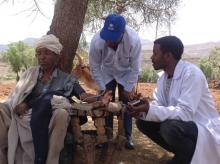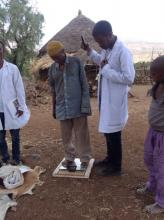WHO provides supportive supervision to Ethiopia’s nationwide NCD STEPs survey
As part of its commitment to provide technical support to Ethiopia’s efforts to ensure the health of its people, the WHO Ethiopia Country Office engages in supportive supervision of research and health intervention across the country. On 7-9 May 2015, a WHO delegation led by Dr Pierre M’pele, WHO Representative, was on mission in Lalibela of Amhara Region in northern Ethiopia for supportive supervision of the ongoing non-communicable diseases (NCD) STEPs Survey.
Ethiopia is currently conducting a nationwide NCD STEPs Survey, the first of its kind spanning the whole country. The STEPs survey is a population-based descriptive cross-sectional study conducted using the WHO stepwise survey methodology in order to determine the risk factors for specific NCDs in the country and measure the prevalence of selected NCDs for the purpose of informing policy and program development. The last NCD survey was conducted in the year 2008 in localized areas of Gilgel Gibe Field Research Center.
The STEPs survey is important and timely because NCDs pose a growing and serious health concern for Ethiopians, accounting for 30% of deaths in Ethiopia in 2014. The four major NCDs, namely cardiovascular diseases, cancers, diabetes and chronic respiratory diseases were responsible for more than 80% of NCD-related deaths.
More than 10,000 participants across the country will be enrolled in this study which includes all men and women aged 15-69 years. Five hundred enumeration areas (EAs) randomly selected by the Central Statistics Authority (CSA) are expected to be covered nationwide, with approximately 337 rural and 136 urban EAs.
The WHO delegation, which also comprised Dr Abebayehu Mengistu, Disease Prevention and Control Cluster Head and Mr Henok Kebede, Data Manager in the Country Office, visited Genete Mariam Kebele of Lalibela to supervise the conduct of the survey. They provided on-site supportive supervision, also assessing the progress made so far and checking to ensure the quality of the ongoing survey is in accordance with the WHO STEPs survey protocols. The delegation was pleased to note that all the steps were followed according to the survey protocol and research ethics, which is key to a credible and usable survey outcome.
In addition to supportive supervision of the survey, WHO also provides other technical and logistic support including all the study equipment and supplies (40 cardio-check machines with 10, 500 test strips, 40 blood pressure measurement apparatuses (PB apparatus), 40 body-mass index (BMI) scales and 75 personal digital assistants (PDA) for data collection.
For more information, please contact
Dr. Abebayehu Mengistu,
Cluster Coordinator, Disease Prevention and Control
mengistua [at] who.int" target="_blank">mengistua [at] who.int


